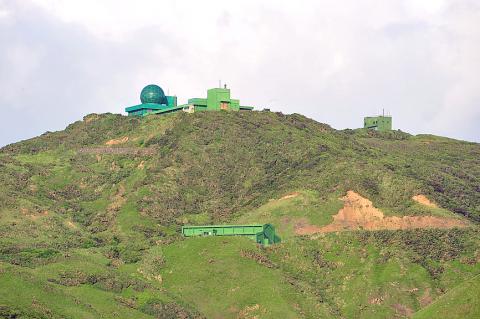Military officials said China has stepped up espionage around Taiwan’s sensitive defense installations in recent weeks, with Chinese intelligence operatives posing as tourists to take photographs and gather information at Jioupeng Military Base (九鵬基地) in the south.
The latest incident occurred on Friday last week, the day before the meeting between President Ma Ying-jeou (馬英九) and Chinese President Xi Jinping (習近平) in Singapore, when a Chinese tourist was stopped from taking closeup pictures of technical staff and officers in uniform at several restaurants just outside of Jioupeng Military Base, which is on a hill overlooking the Pacific Ocean in Pingtung County’s Manzhou Township (滿州).
A military official who requested anonymity said there were numerous incidents of suspected espionage activities around Jioupeng, a base that houses the nation’s most advanced guided missiles and a vital installation for missile test-fire launches, by Chinese who were taking photographs in the area, some carrying sophisticated cameras and photography equipment.

Photo: Tsai Tsung-hsien, Taipei Times
The timing of their activities was judged to be too much of a coincidence, because the technical and operational staff at the Jioupeng base were busy conducting various scheduled missile firing and flight tests from Oct. 21 to Friday, with two daily sessions in the morning and in the afternoon, the military official said.
In light of Xi’s remark in Singapore that more than 1,000 missiles in China’s southeast provinces were not aimed at Taiwan, the official said: “It is appalling that China is playing a two-faced tactic to deceive us. Chinese officials said they want to reduce cross-strait hostilities, but they are actively spying on our most important missile base.”
“Opening up our nation’s tourism to independent travelers from China has caused too much trouble for our military installations,” he said.
The Chinese man in Friday’s incident spoke with a Cantonese accent and said he was an independent tourist traveling around Taiwan when questioned by military officers after taking pictures of uniformed personnel.
The officers found he had taken many close-up photographs, including ones of name tags, of technical staff and military officers from the base. He was forced to delete those pictures, then released.
In the first week of this month, a local resident reported to authorities that an unidentified person carrying sophisticated photography equipment had driven to a hill opposite the Jioupeng base and pointed his camera at base installations.
When local police arrived in their cruiser, the man sped off.
There were also incidents reported of Chinese tourists “playing” with drones that have cameras on them outside the Jioupeng base last month.

ENDEAVOR MANTA: The ship is programmed to automatically return to its designated home port and would self-destruct if seized by another party The Endeavor Manta, Taiwan’s first military-specification uncrewed surface vehicle (USV) tailor-made to operate in the Taiwan Strait in a bid to bolster the nation’s asymmetric combat capabilities made its first appearance at Kaohsiung’s Singda Harbor yesterday. Taking inspiration from Ukraine’s navy, which is using USVs to force Russia’s Black Sea fleet to take shelter within its own ports, CSBC Taiwan (台灣國際造船) established a research and development unit on USVs last year, CSBC chairman Huang Cheng-hung (黃正弘) said. With the exception of the satellite guidance system and the outboard motors — which were purchased from foreign companies that were not affiliated with Chinese-funded

PERMIT REVOKED: The influencer at a news conference said the National Immigration Agency was infringing on human rights and persecuting Chinese spouses Chinese influencer “Yaya in Taiwan” (亞亞在台灣) yesterday evening voluntarily left Taiwan, despite saying yesterday morning that she had “no intention” of leaving after her residence permit was revoked over her comments on Taiwan being “unified” with China by military force. The Ministry of the Interior yesterday had said that it could forcibly deport the influencer at midnight, but was considering taking a more flexible approach and beginning procedures this morning. The influencer, whose given name is Liu Zhenya (劉振亞), departed on a 8:45pm flight from Taipei International Airport (Songshan airport) to Fuzhou, China. Liu held a news conference at the airport at 7pm,

Taiwan was ranked the fourth-safest country in the world with a score of 82.9, trailing only Andorra, the United Arab Emirates and Qatar in Numbeo’s Safety Index by Country report. Taiwan’s score improved by 0.1 points compared with last year’s mid-year report, which had Taiwan fourth with a score of 82.8. However, both scores were lower than in last year’s first review, when Taiwan scored 83.3, and are a long way from when Taiwan was named the second-safest country in the world in 2021, scoring 84.8. Taiwan ranked higher than Singapore in ninth with a score of 77.4 and Japan in 10th with

GRIDLOCK: The National Fire Agency’s Special Search and Rescue team is on standby to travel to the countries to help out with the rescue effort A powerful earthquake rocked Myanmar and neighboring Thailand yesterday, killing at least three people in Bangkok and burying dozens when a high-rise building under construction collapsed. Footage shared on social media from Myanmar’s second-largest city showed widespread destruction, raising fears that many were trapped under the rubble or killed. The magnitude 7.7 earthquake, with an epicenter near Mandalay in Myanmar, struck at midday and was followed by a strong magnitude 6.4 aftershock. The extent of death, injury and destruction — especially in Myanmar, which is embroiled in a civil war and where information is tightly controlled at the best of times —